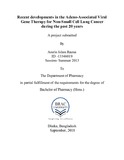Recent developments in the Adeno-Associated Viral Gene Therapy for Non-Small Cell Lung Cancer during the past 20 years

View/Open
Date
2013Publisher
Brac UniversityAuthor
Razna, Amrin IslamMetadata
Show full item recordAbstract
Gene therapy has a diverse plethora of applications. Many genetic diseases – including both dominant gain-of-functions diseases and recessive conditions have an equal opportunity to be cured by it.
In this study, the treatment of non-small cell lung cancer with the help of gene therapy using adeno-associated virus (AAV) vector is the focal point. Non-small cell lung cancer requires multiple drugs for effective treatment. In spite of this the survival rate is low compared to other forms of cancer. In addition to this, the choice of drugs and methods of treatment greatly depends on the health of the patient. Gene therapy is considered to be an ideal treatment in this study. It not only cures the condition from the root level but also can be applied to all patient types. AAV is used in place of adenovirus, in the light that even though its onset of action is slow, its duration of action is greater.
Many techniques of gene therapy have been covered in this review. These include CRISPR-Cas9 technology, zinc-finger nuclease, splicosome-mediated RNA trans-splicing, RNA interference technique, antisense-oligonucleotide therapy. The future of gene therapy can be promising if these techniques could become more developed by thorough and rigorous experimentation to refine their methodologies.
